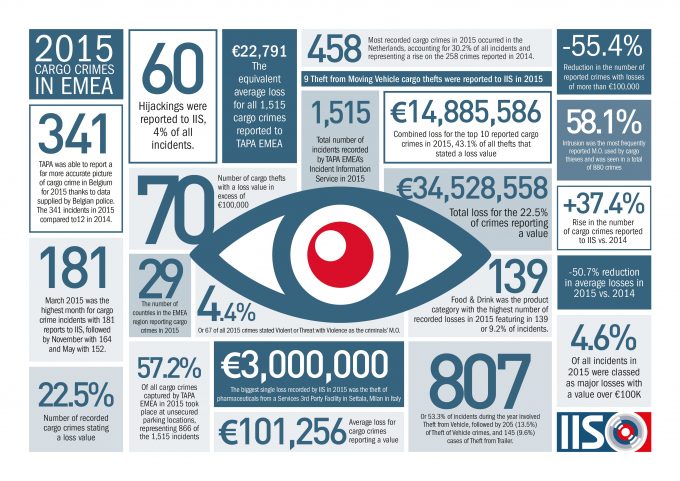Strategies to prevent your containers 'going missing'
TT Club typically focuses on cargo theft when it considers supply chain security, but there ...

Increasingly violent criminals are now targeting all types of cargo, including low-value shipments, in a new trend, Transported Asset Protection Association (TAPA) reported this morning.
The average loss in 2015 in the EMEA region was €101,256 – but only 22.5% of reported incidents had a loss value. The majority of cargo crimes comprised theft from vehicles at unsecured parking spots, including motorway service stations and lay-bys.
“The real trend we are seeing is that cargo thieves are now prepared to target virtually any product,” ...
Maersk u-turn as port congestion increases across Northern Europe
Maersk Air Cargo sees volumes fall as it aims for 'margin in favour of revenue'
Keep our news independent, by supporting The Loadstar
Container spot rates diverge: to Europe still falling, but firmer to the US
Hapag-Lloyd won't take bookings if port congestion leaves cargo stranded
Ecommerce likely the front-runner in resurge of transpacific trade after deal
Airfreight players eye new routes as demand on the transpacific nosedives
China-US trade tariff pause could drive a rebound for transpacific rates
Service chaos from trade ban with India a problem for Pakistan shippers
Airfreight rates ex-China 'loss-making', but hopes of a trade deal stay high
Indian coastal freight attracts major carriers, but regional tension disrupts
Serious threat to jobs in US logistics as tariffs cause economic 'stagflation'
APMM floats along on 'solid' Q1 profitability in Ocean, well prepared for choppy water
MSC in terminal switch as Nhava Sheva gets strong start to new fiscal year
White House u-turns see freighters flying but keep logistics players on their toes
Carriers impose 'emergency operation' surcharges on Pakistan cargo

Comment on this article
Darren
June 09, 2016 at 9:42 ami personally have never had a load stolen, but I have had curtains slashed. One of my friends who carries the same type of cargo as me( usually insulation) had thieves trying to steal a pallet of glass wool, but after unsuccessfully trying, they gave up, and left him a parting gift by pulling the kingpin handle.